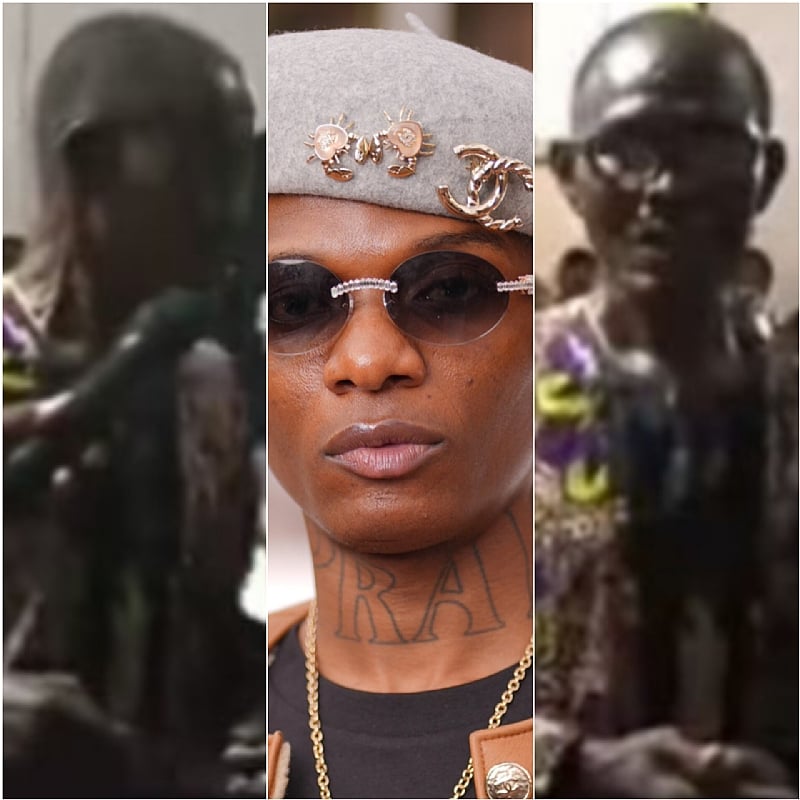The viral video capturing the desperate plea of an elderly man claiming to be Wizkid’s biological father has ignited a firestorm of controversy and speculation across Nigeria. The man, visibly distressed and frail, sits before the camera, his voice trembling as he implores Nigerians to intervene in his dire situation. He alleges that despite his son’s astronomical wealth and international fame, he has been left to languish in poverty and neglect in Benin City. This heart-wrenching appeal, amplified by the vast reach of social media, has touched a nerve within the Nigerian public, sparking a wave of sympathy and outrage, while simultaneously raising questions about the veracity of the man’s claims and the complexities of family relationships within the context of fame and fortune.
The elderly man’s account hinges on a powerful catalyst – a pastor’s prophecy delivered during a church service. He recounts how the pastor’s words about a suffering parent with a wealthy, yet neglectful child resonated deeply within him, igniting a spark of recognition and prompting him to come forward with his story. This prophetic intervention adds a layer of religious and spiritual intrigue to the narrative, lending weight to the man’s claims in the eyes of some, while potentially raising skepticism in others. The intersection of faith, family, and public appeal serves as a potent backdrop for this unfolding drama, highlighting the powerful influence of religious figures and prophecies within Nigerian society.
The crux of the man’s assertion lies in his bold declaration: “I have a rich son somewhere, but he has forgotten about me.” This statement, delivered with a mixture of sorrow and indignation, encapsulates the core of his grievance. He then unequivocally identifies Wizkid, born Ayodeji Balogun, as the affluent son who has allegedly abandoned him to a life of hardship. This direct accusation against one of Nigeria’s most celebrated musical icons elevates the story from a personal tragedy to a public scandal, drawing intense scrutiny to Wizkid and his alleged disregard for familial obligations. The explicit naming of Wizkid transforms the narrative into a high-profile controversy, placing the spotlight squarely on the musician and demanding a response, whether directly or through his representatives.
The video’s rapid dissemination across social media platforms like Facebook has fueled a multifaceted public response. On one hand, a wave of sympathy and empathy has emerged for the elderly man, with many expressing outrage at the purported neglect by a son who enjoys immense wealth and privilege. Calls for Wizkid to acknowledge and address the situation have echoed across social media, demonstrating the public’s expectation of accountability from prominent figures. Conversely, a current of skepticism also runs through the online discourse, with some questioning the authenticity of the man’s claims and urging caution before rushing to judgment. This division underscores the inherent complexities of such situations, where public perception can be swayed by emotional appeals while the truth remains shrouded in ambiguity.
The ensuing debate highlights the broader societal implications of wealth disparity and the perceived responsibilities of successful individuals towards their families and communities. Wizkid’s meteoric rise from humble beginnings to international stardom serves as a stark contrast to the alleged plight of his supposed father, magnifying the perceived injustice of the situation. This contrast fuels discussions about the moral obligations of the wealthy to uplift those around them, particularly their family members. The case also raises questions about the pressures and expectations placed upon successful individuals, particularly in a culture that often emphasizes familial support and reciprocity. Regardless of the veracity of the man’s claims, the situation underscores the complex relationship between personal responsibility, public image, and societal expectations in the age of social media.
The unfolding saga surrounding the elderly man’s claims presents a multifaceted narrative with far-reaching implications. While the truth of his paternity claim remains unverified, the video’s emotional power has undoubtedly resonated with many Nigerians, sparking a national conversation about family, responsibility, and the complexities of navigating fame and fortune. The incident underscores the potent influence of social media in amplifying personal stories and holding public figures accountable. Whether the man’s claims are ultimately substantiated or refuted, the situation serves as a poignant reminder of the human stories that often lie beneath the veneer of celebrity, and the enduring power of family ties, both real and perceived. The public awaits further developments with bated breath, eager for clarity and resolution in this emotionally charged and publicly scrutinized family drama.














